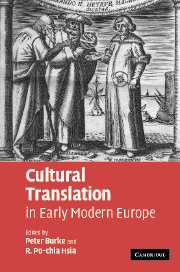Book contents
- Frontmatter
- Contents
- Notes on contributors
- Introduction
- PART I TRANSLATION AND LANGUAGE
- PART II TRANSLATION AND CULTURE
- 5 Early modern Catholic piety in translation
- 6 The translation of political theory in early modern Europe
- 7 Translating histories
- 8 The Spectator, or the metamorphoses of the periodical: a study in cultural translation
- PART III TRANSLATION AND SCIENCE
- Bibliography
- Index
8 - The Spectator, or the metamorphoses of the periodical: a study in cultural translation
Published online by Cambridge University Press: 27 July 2009
- Frontmatter
- Contents
- Notes on contributors
- Introduction
- PART I TRANSLATION AND LANGUAGE
- PART II TRANSLATION AND CULTURE
- 5 Early modern Catholic piety in translation
- 6 The translation of political theory in early modern Europe
- 7 Translating histories
- 8 The Spectator, or the metamorphoses of the periodical: a study in cultural translation
- PART III TRANSLATION AND SCIENCE
- Bibliography
- Index
Summary
The fortunes of the English Spectator (1711–14) and its followers, in Europe and elsewhere, may be said to represent one of the most successful enterprises of both literal and cultural translation in the history of printed communication. Its study provides a vivid illustration of the problems and dilemmas of what was known in the eighteenth century as good and bad imitation, while we now describe it as cultural translation – in other words, the adaptation of a text to new contexts. A daily paper published intermittently between 1711 and 1714, The Spectator was not the first periodical to be edited by the English men of letters Joseph Addison and Richard Steele. They had already collaborated on The Tatler, which appeared three times a week between 1709 and 1711. Its name means ‘someone who gossips’, and indicates the conversational tone as well as the topicality of the paper.
However, it was in The Spectator that they found the formula for both national and international success. Even the beginning of this trend gives testimony that The Spectator, the so-called original model of the Spectator genre of journalism, did not involve a complete break with older trends, as is usually presented; it involved, in fact, a work of cultural translation and is best described as the culmination of tendencies in the history of the seventeenth-century press.
- Type
- Chapter
- Information
- Cultural Translation in Early Modern Europe , pp. 142 - 160Publisher: Cambridge University PressPrint publication year: 2007
- 4
- Cited by



